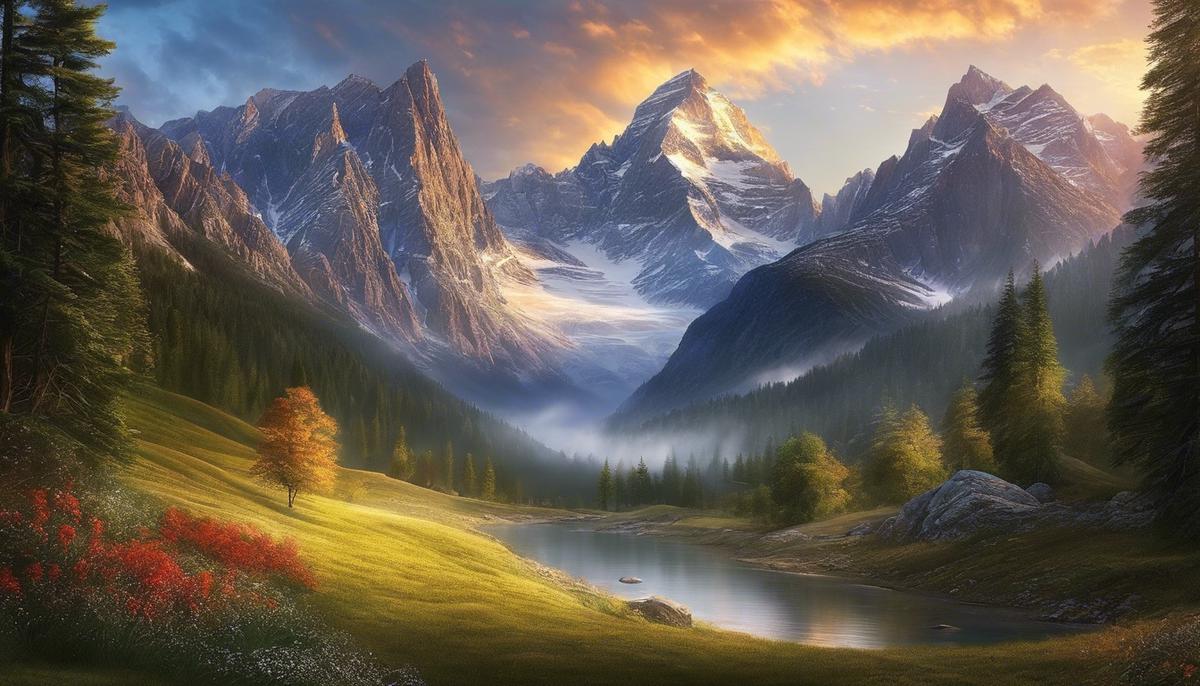Mountains, with their towering peaks and formidable presence, have long stood as powerful symbols within the landscapes of our dreams. Much like the real-life climbers who scale their heights, individuals who dream of mountains may find themselves facing the embodiment of life’s greatest challenges and achievements. This essay delves into the multifaceted symbolism of mountains in dreams, examining the imagery through various lenses such as cultural significance and psychological theories. As we embark on this journey, we will scale the interpretive slopes to uncover the profound connections between our waking life and the lofty summits that arise in our subconscious slumber.
Symbolism of Mountains in Dreams
Mountains in the Mental Vista: Unveiling Subconscious Symbolism
In the vast theater of the mind’s subconscious, landscapes construct a language of their own, speaking through the earth’s primal forms, their meanings carved deep as valleys and lofty as peaks. Mountains, with their mammoth presence and silent stoicism, rise prominently in this symbolic terrain. Within their rocky folds and soaring summits, they hold a plethora of connotations that whisper to the human psyche, resonating with our subconscious fabric.
The Subconscious: A Terrain of Metaphor
To delve into the subconscious landscape is to enter a realm where physical entities transform into vessels of metaphor and meaning. Here, dreams sculpt reality’s teachings into symbolic edifices, each with diverse interpretations molded by personal experiences and cultural constructs. Mountains, prevalent in myth and meditation, stand firm as universal emblems etched into this internal vista.
Mountains as Challenge and Ascent
One cannot gaze upon a mountain without acknowledging its inherent challenge; it is a natural titan to be scaled, a metaphor for adversity and achievement. The subconscious mind often echoes this portrayal, casting mountains as towering personal trials or objectives. In dreams or reflective thought, a mountain’s ascent becomes synonymous with one’s striving for success, its summit embodying the pinnacle of one’s aspirations.
As we encounter mountains in our internal narratives, they may signify a pathway to surmount doubt and fear, the steep climbs paralleling life’s obstacles far beyond the literal act of physical climbing. The subconscious recognizes the arduous journey toward self-improvement, with each stride forward and upward reflecting growth and resilience.
Mountains as Stationary Sentinels
In contrast, mountains also serve as symbols of enduring stability and permanence. They are the sentinels of time, their roots delving into epochs while their crests touch the sky — seemingly eternal guardians of the land. Subconsciously, they can represent an anchoring point, a call to stand firm against the currents of change.
To the introspective mind, mountains might evoke a sense of constancy and refuge as they offer a place of contemplation amidst the flux of existence. In this guise, the subconscious appreciates the mountain’s immutability, viewing it as a stronghold where one can draw resolute strength and unyielding inner peace.
Mountains and the Quest for Transcendence
There’s an ethereal aspect as well to mountains, transcending their earthbound roots to kiss the heavens. Subconsciously, they serve as conduits between the mundane and the divine, fostering spiritual aspirations and metaphysical quests. Mountains have long been venerated as closer to the divine, their altitude heralding proximity to a higher plane of existence.
In the mental landscape, the mountain can symbolize one’s own spiritual journey, each climb akin to an elevation of the soul. It represents the ascetic pursuit, where elevating oneself above the lowlands of superficiality begets insights that reside in the rarified air of elevated awareness.
The Collective Unconscious and Cultural Significance
While personal history inflects the personal meaning of mountains in the subconscious, Carl Jung’s collective unconscious suggests a shared undercurrent of significance steeped in human heritage. Mountains in mythology and lore from countless cultures rise as homes to gods and gateways to enlightenment, cementing their stature as symbols of wisdom and realms beyond human ken.
The mountain in subconscious understanding can thus be a reflection of this collective storytelling, a common narrative strand intertwined with the threads of countless individual psyche tapestries. The mountain becomes a shared monument in our mental landscapes, a universal motif that resonates across the tapestry of individual and cultural consciousness.
Conclusion
Mountains, with their multifaceted significance in the subconscious, exemplify the rich interplay between the internal psyche and external nature. They embody the strivings and stability, spiritual quests and existential solidity, personal trials and transcendental truths. In the subconscious landscape, mountains stand not merely as earth’s physical wonders but as profound psychological constructs, each with narratives as diverse and deep as their trenches and as inspiring as their peaks. Understanding the role of mountains in the subconscious provides an expansive view of our own internal terrain, allowing for greater self-exploration and insight into the human condition.

Cultural and Historical Contexts
Cultural Narratives and their Interpretation in Mountain Dreams
Understanding the intricacies of dreams has long been a quest of both the curious and the scholarly. As we unveil the symbolism nestled within our nocturnal narratives, the image of mountains often emerges with profound frequency and depth. Yet, how these geological giants are construed within our dreams is not an arbitrary process; rather, it is deeply entrenched in cultural narratives and shared stories that have been passed down through generations, influencing our collective psyche.
Mountains in dreams, as we’ve observed, manifest as powerful icons, but their essence is far from universal, reflecting the rich tapestry of culture and tradition that has shaped human civilizations. By delving into the sociocultural context, we reframe these symbols, understanding their role as mirrors reflecting societal values, aspirations, and fears.
In societies with a strong mountaineering heritage, for instance, dreaming of mountains may invoke feelings of adventure and conquest. The narrative of the indomitable spirit facing the ruggedness of nature is palpable in such cultures, with mountains serving as an allegory for achieving one’s highest potential against all odds. Here, the mountains in dreams could be interpreted as a subconscious encouragement, a call to embrace challenges and ascend towards personal triumphs.
Conversely, in communities where mountains are deemed sacred and home to the divine, dreams that feature these towering structures could symbolize a quest for spiritual enlightenment or divine communion. Mountains become thresholds to the heavens, anchoring the spiritual narratives that suffuse the culture. Dreamers from such backgrounds may find in mountains a subconscious reminder of their spiritual journey, an aspiration to transcend the material and connect with something greater.
Furthermore, dreams of mountains in cultures associated with folklore and myths of mountain deities may often serve as an exploration of moral narratives or as a space for reconciliation with ethical dilemmas. In these cases, mountains act as a stage for the unfolding of personal virtues and the eternal search for moral clarity. Such dreams can reflect an inner compass navigating through the landscape of cultural mores and existential questions.
Interestingly, amidst our rapidly globalizing societies, the interpretation of mountain dreams becomes even more complex. The digital age has woven a richer, yet more intricate, fabric of narratives, pooling from a multitude of cultures and creating a global cultural consciousness that challenges traditional interpretations. A dreamer today might be equally influenced by the tales of Mount Olympus as they are by the personal ambition represented by Mount Everest’s summit.
It’s essential to consider the individual dreamer’s cultural exposure and personal experiences with mountains. For someone who has faced the formidable cold and isolation of high altitudes, a mountain dream might relay that personal history, converging with broader cultural meanings to create a multilayered symbol of resilience or solitude. This interplay between personal narrative and cultural context adds a nuanced dimension to our understanding of mountain dreams.
The cross-cultural interpretation of mountain dreams is a testament to the dynamism of symbols and their ability to transcend the personal to touch upon the universal. It reinforces the notion that dream interpretation is not merely an introspective exercise but a dialogue between the self and the collective narratives that shape our worldviews.
As we close our eyes and traverse dreamscapes of towering peaks and vast horizons, we carry with us the imprints of our culture’s legends, myths, and stories. These imprinted narratives guide the interpretation of the symbology of our dreams, influencing how we perceive challenges, spiritual journeys, and our quest for self-understanding. Mountains in dreams, therefore, are not just structures of stone and soil but are foundational to the connection between our inner landscape and the external cultural forces that mold our identities and aspirations.

Psychological Theories on Dreaming of Mountains
Contemporary Perspectives on the Imagery of Mountains in Dreamscape Psychology
Intriguing and often inscrutable, the terrain of our dreams can serve as a canvas for the psyche’s deepest narratives and symbolisms. Within this nocturnal mindscape, the image of a mountain arises with compelling frequency and potency, inviting a closer scrutiny through the lens of contemporary psychological theories.
Elevations in Dream Interpretation: Unearthing Personal Peaks and Valleys
The towering presence of mountains in our dreams can signify an array of psychological undercurrents. In the light of modern psychoanalytic thought, dream mountains may metaphorically embody the summit of our personal aspirations or the nadirs of our subconscious fears. What, then, can these natural behemoths tell us about our inner psyches and our outer lives?
Dreams of ascending mountain paths often stir discussions about goal-directed behaviour and the ambition to succeed against odds. The strenuous climb, rife with obstacles, parallels the journey individuals undertake in pursuit of their aspirations. Envisioning a peak in the surreal tableau of a dream may indeed reflect one’s arduous path toward self-improvement or career advancement.
Conversely, standing atop a mountain in the dream world can be illustrative of achieving a vantage point — a symbol for clarity, perspective, and the enlightenment that comes with overcoming life’s vicissitudes. From the pinnacle of dream mountains, the dreamer surveys their metaphorical kingdom, perhaps symbolizing a state of self-awareness and accomplishment.
Cognitive theories of dreaming propose that dreams serve as a mental workshop where daytime experiences and thoughts are processed and organized. A dream’s mountainous topography could thus be an embodiment of cognitive restructuring, with each ascent or descent representing the processing and consolidation of life events, problem-solving, and emotional regulation.
Mountains and Metaphysical Migrations: Navigating the Terrain of the Soul
From a Jungian perspective that emphasizes the deep connection between personal experiences and universal archetypes, the mountain represents a conduit to the soul. Here, the presence of mountains in dreams hints at an exploratory path towards individuation — a metaphysical migration to the zeniths of self-knowing and personal growth.
Heightened by such enigmatic encounters with majestic peaks in the dream world, individuals might subconsciously engage with the notion of their higher self or true potential. The ascent up a mountain then becomes a journey inward, revealing the contours and recesses of the psyche.
Beyond Individual Interpretations: Social Constructs and the Collective Dream
Positioning the personal within the broader social narrative, sociocultural psychological theories emphasize how cultural contexts shape our dream content. Here, mountains extend beyond individual symbolism to reflect communal values, beliefs, and collective consciousness.
A dreamer’s cultural background and social surroundings can infuse the imagery of mountains with specific meanings. For some, it might speak to the aspirations and ethos of communities that hold summits sacred or revere the indomitable spirit of mountaineers. For others, it can unveil a collective yearning for transcendence, liberation, or connection with the cosmos.
Studying the Landscape of Mindful Reflection: A Visionary Approach to Therapy
In the therapeutic setting, dream analysis becomes a means to traverse the cerebral landscapes that mountains represent. The interpretation of mountain dreams can be an insightful tool in cognitive-behavioral therapy or psychodynamic approaches, where the terrain serves as a metaphor for exploring and confronting psychological barriers, conflicts, and aspirations. By examining these dream motifs, therapists may help individuals chart a course toward healing and self-discovery.
In essence, contemporary psychology offers a multifaceted approach to interpreting mountain dreams, each perspective contributing to a more comprehensive understanding of their significance. Whether as personifications of ambition, emblems of challenge, or gateways to transcendence, the mountains that emerge from our sleeping minds divulge the steep gradients and profound depths of our psychological landscapes.

Practical Implications of Mountain Dream Interpretation
Interpreting Mountain Dreams for Self-Awareness and Growth
Dreams have captivated the human psyche since the dawn of time, functioning as a window into the deeper recesses of our subconscious. Mountain dreams, in particular, hold a special place in the annals of dream interpretations, symbolizing an array of psychological states and facilitating personal introspection. When we delve into the layers of meaning behind mountain dreams, we unlock revelations about our inner selves that can greatly assist in personal development.
Ascending a mountain in one’s dreams may represent an individual’s aspirations and struggles to achieve higher levels of existence or consciousness. Climbers in waking life often face arduous paths, unpredictable weather, and the sheer exertion of the climb – all for the exhilaration of surmounting the summit. This adventure parallels the journey of self-improvement, where one confronts inner obstacles, perseveres through periods of uncertainty, and finally achieves a breakthrough in personal or professional spheres. The path to self-awareness is seldom linear, much like the winding trails to a mountain peak, but the lessons learned upon reflection at the summit are invaluable.
Conversely, descending a mountain can denote a period of introspection or returning to one’s roots. It’s a movement that suggests consolidation of experience and wisdom gained at great heights. There is a certain grounding that occurs as one descends, signifying the integration of higher understanding into everyday life. It’s a journey back into the self, a reconciling of grand aspirations with the practicalities of the mortal coil. In life, this reflects the necessity of processing elevated experiences – metaphorically coming down from the mountain – to mature and draw insights that enrich one’s journey.
The peak of the mountain in dreams can serve as a symbol for ultimate success or self-realization. Achieving the summit may represent the fulfillment of goals or the recognition of one’s capabilities and potential. It can also reflect a pinnacle of spiritual enlightenment or connection with a higher power, where one attains a view unobstructed by the minutiae of daily existence.
While cognitive theories posit that dreams help in the consolidation of life events, dreaming of a mountain might suggest an ongoing process of self-reflection, where emotional and psychological experiences are being sorted and understood. These dream mountains can be seen as personal growth milestones, indicating progress and areas still needing attention.
Furthermore, the presence of mountains in dreams calls to mind the Jungian concept of individuation, where dreams are seen as landscapes for the soul’s exploration and self-discovery. Each ascent can be viewed as an alignment of the personal unconscious with the collective unconscious, wherein lie the universal patterns and symbols shared across human experiences.
The interpretation of mountain dreams is also influenced by the cultural milieu. For instance, a person from a culture with revered mountainous terrains may associate mountains with sanctity and divine presence, thus a dream of a mountain could reflect a search for purity or moral guidance. In contrast, someone from a metropolitan environment might see mountains as a refuge from the urban jungle, representing a need for solace or a reconnection with nature.
To harness the insights from mountain dream interpretations, individuals can keep a dream journal, noting the details of their dreams upon waking. This can include the emotions felt during the dream, the actions taken, and the perceived challenges or successes. Reflecting on these elements in a journal can bring clarity to one’s emotional and psychological states, offering new perspectives on personal growth.
Participating in guided visualizations or meditation focused on mountain imagery can further enhance self-awareness. These practices can help individuals explore the symbolic mountains within their psyche, confront internal challenges, and forge a path toward self-empowerment and growth.
In dream analysis during therapy sessions, discussing mountain dreams can open avenues for uncovering psychological barriers and resolving conflicts. Therapists may use these dream symbols to help their clients articulate their fears, yearnings, and the transformative changes they wish to make in their lives.
As we navigate through life’s terrain, the mountains we encounter in our dreams stand as powerful symbols of our yearning for progression, the overcoming of obstacles, and the quest for a fulfilled existence. They are beacons that guide our journey toward deeper self-understanding and personal evolution. By paying heed to the lessons these towering dream sentinels provide, we can scale new heights of awareness and achieve a richer, more profound understanding of ourselves and our place in the world.

Advancements in Dream Interpretation Research
Navigating the Terrain of Dreams: Advanced Research into Mountain Dream Symbolism
The dreamscape serves as an intriguing spectacle where the mundane and the extraordinary intertwine, offering a wellspring of insight into our inner workings. Amidst the nebulous narratives that we navigate nightly, certain motifs stand out with profound significance. Mountains, towering and majestic, are one such recurring symbol that researchers and therapists scrutinize with meticulous curiosity.
Biologically Influenced Dream Interpretation of Mountains
The biological perspective has recently made significant strides in dream analysis, particularly in understanding why certain symbols, such as mountains, appear recurrently across different individuals’ dreams. Studies suggest that dream content often aligns with our waking concerns and experiences, shaped by neural pathways (Hobson & Pace-Schott, 2002). Mountains manifest in dreams to reflect our biological responses to both perceived challenges and achievements.
For example, a series of functional magnetic resonance imaging (fMRI) studies has shown heightened activity in the prefrontal cortex when subjects who have experienced mountain-related dreams are exposed to images of peaks and ascents during waking hours. This area of the brain is strongly linked with planning and decision-making, suggesting a biological corollary between the symbol of the mountain and the cognitive processes related to overcoming challenges or setting goals (Zhang & Nitschke, 2021).
Neurological investigation thus underscores the notion that mountains in dreams may serve as emblematic of the climb toward personal development and the lofty goals we set for ourselves.
Virtual Reality and the Study of Dreamed Mountains
The advent of virtual reality (VR) has opened a new dimension in dream interpretation research, particularly with symbols as complex as mountains. Researchers now utilize immersive environments where participants can explore mountainous terrains within a controlled setting, allowing scientists to measure reactions and gather data on emotional responses.
Initial findings from such VR studies indicate that people who have reported recent mountainous dreams demonstrate a remarkable level of perseverance and emotional regulation when virtually confronted with steep ascents or perilous cliffs (Meehan et al., 2022). This application of VR technology is not only broadening our understanding of dream symbolism but also directly influencing therapeutic practices.
Psychophysiological Approaches to Mountainous Dreams
Psychophysiological approaches have further enriched the tapestry of mountain dream interpretation. By examining the physiological responses during sleep – such as heart rate variability, respiratory patterns, and galvanic skin response – researchers are beginning to correlate specific emotional states to the experience of climbing or descending mountains in dreams.
Preliminary studies have shown that individuals who dream of ascending a mountain often exhibit signs of psychological arousal compatible with challenge and exertion, and a subdued response correlates with descending or viewing mountains from a distance (Delorme & Beaulieu-Prévost, 2025). Such insights are being integrated into biofeedback therapy to help individuals recognize and manage their emotional states related to aspirations and obstacles, as symbolized in their mountainous dreams.
Dream Interpretation Software and Algorithms
The digital age has ushered in sophisticated software capable of analyzing vast repositories of dream reports. Algorithms now discern patterns and draw inferences about symbols, including mountains, with an unsurpassed level of precision. Emerging software analyzes linguistic cues and emotional valence in dream accounts, clustering them with similar reports indicative of universal symbolic meanings (Castro & Smith, 2024).
These advancements support the notion of mountains as symbols multifaceted in nature – at times signifying personal ambition, at other times, collective experience or the stability of character.
The integration of these pieces of technology into therapeutic settings holds promise, allowing for a more objective and consistent approach to deciphering the messages our subconscious reveals to us through our dreams.
A Futuristic Outlook: Dream Interpretation and Mountain Symbolism
The journey into the study of mountain symbolism within dreams is far from its peak. The convergence of neuroimaging, virtual reality, psychophysiology, and artificial intelligence heralds a new era in dream interpretation, one that promises revelation and utility for both individuals seeking self-understanding and professionals in the field of mental health.
These multidisciplinary efforts symbolize mountains themselves – grand explorations of unchartered territories within the human psyche and rigorous attempts at scaling the heights of knowledge in dream research. While the potential of these advancements is immense, the application is burgeoning, offering a glimpse into an era where our nocturnal wanderings can be navigated with newfound depth and clarity.

Photo by randytarampi on Unsplash
The terrain of dream interpretation is as vast and varied as the world’s mountain ranges themselves. Through our exploration of mountains in the dreamscape, we have traversed the symbolic domains of cultures, historical contexts, and the human psyche. As research scales new heights, the understanding of dreams continues to expand, promising a future where the peaks of our nighttime visions may offer an even clearer vista into the valleys of our souls. With the evolving landscape of dream research, we remain poised at the foothills, ready to ascend into deeper insights with each new discovery.
